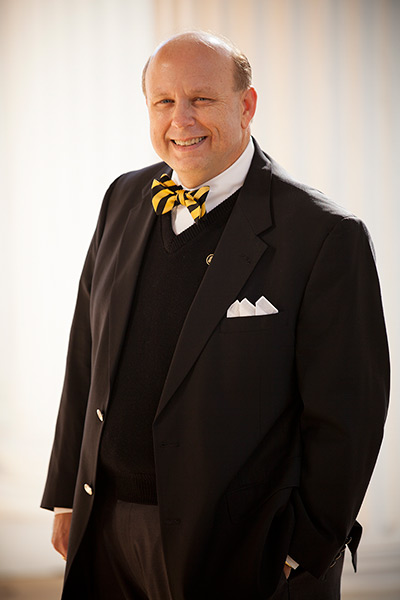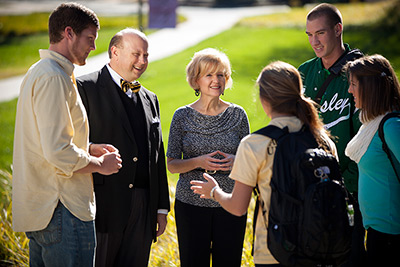As a boy growing up in the 1960s in rural Cleveland County, N.C., Evans Whitaker enjoyed the same things other boys did: jumping creeks, fishing in farm ponds, rummaging through barns, exploring the woods or cutting through a neighbor’s cotton field to meet his friends.
 Whitaker became president of Anderson University in December 2001.
Whitaker became president of Anderson University in December 2001.Even though he loved the outdoors, Whitaker found out early on that he also enjoyed going to school – “a lot.” He also loved being a part of the extended family and life of Sandy Plains Baptist Church, the “center of all life” in his community.
It is no surprise that those two profound influences – school and church – would combine to produce a president of a church-affiliated university. Today, as he begins his second decade as president of Anderson University, Whitaker, 52, still relies on the principles he embraced as a child – intellectual rigor and steadfast faith – to guide him in leading one of the fastest-growing Christian universities in the South.
“I still remember some of the people who taught me as a child,” he said, “and that’s where I got my values – not only from my parents, but from the church.”
If he smiles while recalling childhood memories – of children releasing acorns under a back pew to roll on the sloping floor toward the pulpit during a church service (he admits only to having “witnessed” the misdeed), or how the fire truck from a nearby town of Lattimore came each summer to lead the Vacation Bible School parade through the community, or how some of the people of his church stayed up all night once a year to cook pork shoulders over an open pit to raise extra funds for mission projects – his enthusiasm is no less evident as he talks about Anderson University, a place he says he has “fallen in love with” in the 10 years he has served as the school’s 12th president.
“You come to love the people and the mission of the place; it becomes so important to you,” Whitaker said. “You share the heartbeat of the institution.”
For Whitaker, of course, that shared heartbeat is one of faith and learning.
“At Anderson University, we believe an intellectual education is vital, and we also believe a strong Christian witness is vital,” Whitaker said. “We don’t subscribe to the idea that you can’t have strong academics and great faith at the same time.”
Whitaker said the university engages students in mission work and in “systematically training” faculty in the practice of the integration of faith and learning across all academic disciplines.
“It is important to be intellectually honest with our students while also caring about their character and the disposition of their heart and soul,” he said.
“I want us as a Baptist institution to be faithful to Scripture and to the Lord, and that gives us a lot of freedom to prepare our students intellectually for the journey ahead of them.”
Whitaker’s love for Anderson University is mixed with pride for his institution (“pride as in happy – not arrogant”) and for its achievements over the last decade.
He is quick, however, to dismiss personal credit for Anderson’s growth during his tenure. “There’s not one thing that I’ve accomplished by myself at this institution,” he said.
“I’m amazed how the people who work here and our students have aligned themselves together in support of our strategic plan and goals. What has developed is a passion for continuous quality improvement, achievement and distinction.”
Indeed, some of the school’s milestones during Whitaker’s tenure include:
- Anderson College made the transition to Anderson University.
- Enrollment grew from 1,600 to 2,900, with 400 enrolled in graduate-level programs.
- The endowment doubled.
- A 53,000-square-foot library was constructed.
- Four new residence halls were built.
- Nine graduate degrees were added, including a graduate school of Christian ministry.
- A college of Christian studies and a nursing program were instituted.
- An undergraduate cancer research center was established.
- The school has been consistently listed in the top tier of U.S. News & World Report’s “America’s Best Colleges.”
Despite the growth of the last 10 years, Whitaker said Anderson University still retains the “feel and core values of a small campus, and we don’t want to lose that.”
The university was founded as Anderson College in 1911 by the citizens of Anderson and the South Carolina Baptist Convention. It has been an SCBC-affiliated school through more than 100 years of transition – from women’s college, to junior college, to four-year college, to a university with graduate and post-graduate programs – and Whitaker believes Anderson’s relationship with South Carolina Baptists will remain strong for years to come.
“This place can’t be what it was founded to be – and what it is supposed to be – without a close, mutually beneficial relationship with our convention,” said Whitaker, who, along with his wife, Diane, is a member of Concord Baptist Church in Anderson.
 Anderson University president Evans Whitaker and his wife, Diane, talk with students.
Anderson University president Evans Whitaker and his wife, Diane, talk with students.“Anderson University today is in a far better position to serve our convention and churches than it has ever been. It is our deep desire to develop future pastors and other leaders within our convention.”
Whitaker said he is pleased with how the school’s College of Christian Studies has developed over the last few years and that it serves as “a theological anchor for our identity as a Christian university.”
“I’ve been in Baptist higher education for over 30 years, and I’ve never seen a Christian studies faculty any stronger than the one we have here,” Whitaker said. He is “almost on the edge of [his] seat” waiting to see how the program will grow and become “even more valuable” – not just to the university, but to the South Carolina Baptist Convention.
He said the university’s master of ministry program has “broken some new ground,” and some aspects of the program have been duplicated in other parts of the country.
In the busy and complex world of university advancement and administration, does he ever miss the simpler times of tromping through the woods of his boyhood home near Shelby, N.C.?
“I enjoy getting back to that,” he said. “I enjoy every time I can just take a walk in the forest and whenever I can fish at a farm pond.” Even after he became president of Anderson University, he went back home a couple of times to help with the annual barbecue at Sandy Plains Church.
And although he recognizes the importance of taking time “to just be Evans,” he willingly wears his college president hat most all the time. “It’s just like being a pastor or anyone who feels called to something, to their work,” he said. “It’s your mission. You do it with joy and passion.”
Looking toward his next 10 years, Whitaker said he looks forward to spending them at Anderson University. “I hope I’m still here,” he said. “I didn’t come here to go somewhere else. I serve this place because I love its mission and its people. I love practically everything about Anderson University.”